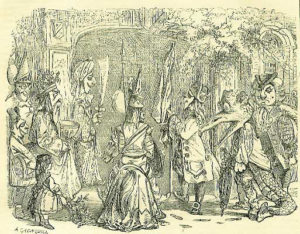“In comes I, Old Father Christmas. Am I welcome, or am I welcome not?” So begins many a mummers’ play as they erupt into the room in celebration of Twelfth Night!
Twelfth Night, when children and fools are kings, and bosses and adults are fools and children, when the forces of Light and Dark meet in a climactic moment, is the night of the Three Kings. It’s also the event for which Shakespeare wrote a wonderful play…..and which, in many parts of North America and the British Isles, includes MUMMERS.
What the heck are Mummers?
Wikipedia says “Mummers Plays (also known as mumming) are seasonal folk plays performed by troupes of actors known as mummers or guisers, originally from the British Isles (see wrenboys), but later in other parts of the world. They are sometimes performed in the street but more usually as house-to-house visits and in public houses. Although the term mummers has been used since medieval times, no play scripts or performance details survive from that era, and the term may have been used loosely to describe performers of several different kinds. Mumming may have precedents in German and French carnival customs, with rare but close parallels also in late medieval England.”
As a performer and performance historian, my perspective on mumming is a little different. Certainly, most mummer “scripts” have, as Wikipedia will tell you, a Doctor, George (Prince, Sir, King, Knight, whatever), Turkish Knight, and often a clown and/or Father Christmas to work the crowd and provide audience interaction. BUT Wikipedia seems to think than a script defines a mummers’ performance, rather than what it truly does, which is provide a framework. It offers a set of characters and interactions that lifts performers into a state of humorous and tender interaction with the audience, whether members of a household, people on the street, or storytellers and families gathered together.
Mumming arises out of the same tradition as sword dances, and ethnohistorians believe they grew out of ancient agrarian societies, with a ritualized sacrifice to ensure the renewed fertility of the land and the people as part of the battle between the old and new year, between winter and spring, between the darkness and the light.






